Hadith 8: On Combat, Conversion, and the Sanctity of Life
Text of the Hadith:
عَنِ ابْنِ عُمَرَ رَضِيَ اللهُ عَنْهُمَا أَنَّ رَسُوْلَ اللهِ ﷺ قَالَ: (أُمِرْتُ أَنْ أُقَاتِلَ النَّاسَ حَتَّى يَشْهَدُوا أَنْ لاَ إِلَهَ إِلاَّ اللهُ وَأَنَّ مُحَمَّدَاً رَسُوْلُ اللهِ وَيُقِيْمُوْا الصَّلاةَ وَيُؤْتُوا الزَّكَاةَ فَإِذَا فَعَلُوا ذَلِكَ عَصَمُوا مِنِّي دِمَاءهَمْ وَأَمْوَالَهُمْ إِلاَّ بِحَقِّ الإِسْلامِ وَحِسَابُهُمْ عَلَى اللهِ تَعَالَى) رواه البخاري ومسلم
Translation:
Ibn ʿUmar (may Allah be pleased with both of them) reported that the Messenger of Allah (peace and blessings be upon him) said: "I have been commanded to fight the people until they testify that there is no deity worthy of worship except Allah and that Muhammad is the Messenger of Allah, establish prayer, and give zakah. If they do so, they have secured their blood and wealth from me, except by the right of Islam, and their reckoning is with Allah the Exalted." (Narrated by al-Bukhari and Muslim)
We have already discussed about the narrator Ibn ʿUmar in a previous hadith. You can refer there.
This hadith captures the essential mission of Islam—to call humanity to the oneness of Allah and submission to His Messenger ﷺ. Islam is the final and only acceptable religion in the sight of Allah, as stated: وَمَنْ يَبْتَغِ غَيْرَ الْإِسْلَامِ دِينًا فَلَنْ يُقْبَلَ مِنْهُ [Āl ʿImrān: 85]. The hadith highlights that the Prophet ﷺ was divinely commanded to confront those who actively obstructed the message, particularly the polytheists and hostile enemies, not to coerce belief, but to clear the path for daʿwah. The obligation to testify to the shahādah, establish the five daily prayers, and give the obligatory zakāh represents the minimal entry into the fold of Islam. These acts were especially emphasised as they are the foundational markers of one’s allegiance to Islam—prayer as the primary physical act of worship, and zakāh as the principal financial obligation. Once these were fulfilled, a person’s life and property gained full protection under Islamic law, unless invalidated by a legitimate legal breach, such as murder or apostasy.
Importantly, this command does not mean forced conversion, for the People of the Book and those on their status were permitted to remain upon their religion by paying Jizyah, a protection tax in an Islamic state. Thus, the fighting described in the hadith was a means to remove barriers against the propagation of Islam, not a compulsion in religion.
Clarifying Misconceptions About the Hadith
The phrase "I have been commanded to fight the people" (umirtu an uqātila al-nās) should be understood in light of Qur’anic principles and Prophetic context. The statement begins with "umirtu" – I have been commanded – which indicates that this command is from Allah, and as a general principle in Islamic jurisprudence, a command to the Prophet ﷺ includes his ummah unless there is specific evidence to the contrary.
The hadith highlights the responsibility placed upon the Prophet ﷺ to confront the opposition that sought to prevent the message of tawḥīd from reaching the people.
The phrase "an uqātila al-nās" indicates active resistance against those who obstruct the spread of Islam, especially those who engage in hostilities. The default understanding is that this was initially directed at the disbelievers in Arabia, and that jihad was legislated to repel aggression and defend the community.
Hence, the hadith must be understood in light of these qualifications, as part of a comprehensive legal and moral framework.
One of the common misunderstandings surrounding this hadith is the apparent generalisation in the Prophet’s ﷺ statement: "I have been commanded to fight the people until they bear witness that there is no god but Allah and that Muhammad is the Messenger of Allah…" Some assume that this implies a divine order to fight all of humanity until they convert, but this interpretation contradicts both the Prophet’s practice and broader Islamic teachings.
In Arabic rhetoric, the term al-nās ("the people") can refer to a specific group rather than all of mankind, just as in the verse: الَّذِينَ قَالَ لَهُمُ النَّاسُ إِنَّ النَّاسَ قَدْ جَمَعُوا لَكُمْ [Āl ʿImrān: 173]. Here, "al-nās" refers to a few individuals, not everyone. Similarly, the hadith refers not to all humans, but primarily to the Arab polytheists who lived in the Arabian Peninsula and waged war against the Prophet ﷺ and his followers, and those in their status who wages war against believers.
The essence of Islamic combat rulings lies in defensive or strategic warfare against hostile forces, not forced conversion. The Prophet ﷺ never compelled anyone to accept Islam, as evidenced by the Treaty of Ḥudaybiyyah, his forbearance during the Conquest of Makkah, and his peaceful agreements with Jewish and Christian communities in Madinah.
Verses such as لَا إِكْرَاهَ فِي الدِّينِ [2:256] — "There is no compulsion in religion" — remain legally valid and universally applicable. The majority of scholars, from both the early and later generations, agree this verse is neither abrogated nor restricted, reaffirming that Islam does not advocate forced conversions. Instead, fighting is prescribed only against aggressors and those who hinder the propagation of truth, as made clear in:
وَقَاتِلُواْ فِي سَبِيلِ اللَّهِ الَّذِينَ يُقَاتِلُونَكُمْ وَلَا تَعْتَدُوا [2:190]. "Fight in the way of Allah those who fight you, but do not transgress. Indeed, Allah does not like transgressors." [al-Baqarah: 190].
The Prophet’s biography clearly demonstrates that he engaged only with hostile forces. He upheld treaties and respected peaceful neighbours. When treaties were broken or aggression initiated, Islam responded in defence and justice. Thus, this hadith is not a license for blanket warfare, but a legal framework for engaging with those who wage war against Islam and its propagation.
It is important to emphasize that the polytheists intended in this hadith were the Arab pagans who were at war with the Prophet ﷺ and his companions. Their alliance and support for Quraysh in fighting against the Prophet ﷺ made them legitimate combatants under Islamic law. They participated in aggressions such as the attack on the tribe of Khuzaʿah—despite Khuzaʿah being under the Prophet’s protection—as well as in the Battle of the Confederates (al-Aḥzāb) and the Battle of Ḥunayn alongside hostile tribes such as Hawāzin.
Islam never mandates forced conversion. The principle is clear: We do not compel anyone to enter Islam. Warfare in Islam is directed against those who actively fight and obstruct the practice and spread of faith. If such individuals embrace Islam, their blood and property become protected. If they do not engage in combat, they are not to be fought, nor compelled to convert. Those who resist Islam through hostility—if they are from the People of the Book or Magians—are not to be fought if they accept the payment of jizyah, a tax levied against their protection under an Islamic state, and this is agreed upon by the scholars.
Furthermore, even in the case of non-Arab polytheists, such as those from the Turks, Indian subcontinent, and others, the majority of scholars—among them Mālik, Abū Ḥanīfah, al-Awzāʿī, and one of the two well-known positions of Aḥmad ibn Ḥanbal—affirm that if they agree to pay jizyah, they are to be treated like the People of the Book. Thus, the aim of Islamic engagement is not conquest for conversion, but removal of barriers against faith and peaceful coexistence under just governance.
Islamic Concept of Pluralism
It is important to understand concept of pluralism in Islam while discussing this hadith. Islam views the diversity of human beliefs is part of divine wisdom:
هُوَ ٱلَّذِي خَلَقَكُمۡ فَمِنكُمۡ كَافِرٞ وَمِنكُم مُّؤۡمِنٞ — "It is He who created you, and among you is the disbeliever, and among you is the believer." [at-Taghābun: 2]; and
وَلَوۡ شَآءَ رَبُّكَ لَجَعَلَ ٱلنَّاسَ أُمَّةٗ وَٰحِدَةٗۖ وَلَا يَزَالُونَ مُخۡتَلِفِينَ — "And if your Lord had willed, He could have made mankind one community; but they will not cease to differ." [Hūd: 118].
The Qur’an commands benevolence and justice towards peaceful non-Muslims:
لَّا يَنۡهَىٰكُمُ ٱللَّهُ عَنِ ٱلَّذِينَ لَمۡ يُقَٰتِلُوكُمۡ فِي ٱلدِّينِ وَلَمۡ يُخۡرِجُوكُم مِّن دِيَٰرِكُمۡ أَن تَبَرُّوهُمۡ وَتُقۡسِطُوٓاْ إِلَيۡهِمۡۚ إِنَّ ٱللَّهَ يُحِبُّ ٱلۡمُقۡسِطِينَ — "Allah does not forbid you from those who do not fight you because of religion and do not expel you from your homes—from being righteous toward them and acting justly toward them. Indeed, Allah loves those who act justly." [al-Mumtaḥanah: 8].
The Prophet ﷺ upheld this principle, even allowing charity towards peaceful polytheist relatives, supported by the verse: ﴿لَّيۡسَ عَلَيۡكَ هُدَىٰهُمۡ وَلَٰكِنَّ ٱللَّهَ يَهۡدِي مَن يَشَآءُ﴾ — "You are not responsible for their guidance, but Allah guides whom He wills." [al-Baqarah: 272].
Furthermore, Allah prohibits harming those who seek peace: فَإِنِ ٱعۡتَزَلُوكُمۡ فَلَمۡ يُقَٰتِلُوكُمۡ وَأَلۡقَوۡاْ إِلَيۡكُمُ ٱلسَّلَمَ فَمَا جَعَلَ ٱللَّهُ لَكُمۡ عَلَيۡهِمۡ سَبِيلٗا — "But if they remove themselves from you and do not fight you and offer you peace, then Allah has not made for you a cause [for fighting] against them." [an-Nisāʾ: 90]. These directives remain in force and are not abrogated.
Conversely, those who instigate conflict and aggression are to be opposed: إِنَّمَا يَنۡهَىٰكُمُ ٱللَّهُ عَنِ ٱلَّذِينَ قَٰتَلُوكُمۡ فِي ٱلدِّينِ وَأَخۡرَجُوكُم مِّن دِيَٰرِكُمۡ وَظَٰهَرُواْ عَلَىٰٓ إِخۡرَاجِكُمۡ أَن تَوَلَّوۡهُمۡ — "Allah only forbids you from those who fight you because of religion and expel you from your homes and aid in your expulsion—that you befriend them. And whoever befriends them—it is those who are the wrongdoers." [al-Mumtaḥanah: 9].
Therefore, Islam promotes a nuanced approach: resistance to hostility, and respect and kindness towards peaceful others, governed by divine justice.
The Protection of Life through Shahādah
The remaining part of the hadith explains, in a legal war as described above, to which extent one can fight. The Prophet ﷺ said: "Until they testify..." Linguistically, the word ḥattā indicates a limit or endpoint. Thus, the fighting continues until the people testify—meaning the moment they declare the shahādah, the command to fight ceases.
The term shahādah (testimony) implies witnessing with knowledge and certainty. This testimony involves both understanding and verbal expression. It is more emphatic than mere acknowledgment (iqrār), which may occur without firm inner conviction. Therefore, when the Prophet ﷺ said "until they testify", it implies a sincere declaration with awareness of its implications.
Scholars have unanimously agreed that in matters of belief (ʿaqīdah), mere assumption is not sufficient. Faith must be based on certainty and conviction. Thus, the shahādah must be declared with conviction and sincerity, not under coercion or doubt.
Once a person accepts Islam, then he will be asked to perform daily prayers and pay zakat if he meets the criteria to pay zakat, and other obligations of Islam.
The Prophet ﷺ laid out a gradual and wise approach in calling non-Muslims to Islam, as demonstrated in his instructions to Muʿādh ibn Jabal when he was sent to Yemen. The Prophet ﷺ said: "Invite them first to testify that there is no god but Allah and that Muhammad is the Messenger of Allah. If they accept that, then inform them that Allah has obligated upon them five prayers each day and night. If they accept that, then inform them that Allah has obligated zakah upon their wealth…" (Bukhārī and Muslim).
This shows that the gateway into Islam is through the two testimonies (shahādah), and once a person enters the faith, they are to be taught and obligated with the remaining pillars of Islam. When Jibrīl (ʿalayhi al-salām) came to the Prophet ﷺ and asked about Islam, the Prophet mentioned the five pillars beginning with the shahādah. Likewise, when the Bedouin came disheveled, asking about Islam, the Prophet mentioned the same sequence.
This sequencing is vital to properly interpret the hadith in discussion. It clarifies that the shahādah alone is what initially grants a person the sanctity of life and wealth, even before they perform prayer or pay zakah. Once a person becomes Muslim, they are expected to perform all obligations. If they abandon pillars such as salah or zakah while remaining within the fold of Islam, they are still judged accordingly—especially if they are a collective with political strength (manʿah), as seen in the precedent of Abū Bakr’s confrontation with those who withheld zakah.
In this context, the famous incident after the Prophet’s ﷺ death further clarifies the hadith’s meaning. When many tribes in Arabia reneged on paying zakah, ʿUmar (RA) questioned Abū Bakr (RA), citing the Prophet’s saying: "I have been commanded to fight the people until they say: Lā ilāha illa Allāh…" But Abū Bakr responded, "By Allah, I will fight those who differentiate between prayer and zakah, for zakah is the due right upon wealth. By Allah, if they withhold even a rope that they used to give to the Messenger of Allah ﷺ, I would fight them for withholding it."
This response shows that the clause "except by the right of Islam" justifies fighting even those who declare the shahādah but violate essential pillars like zakah in defiance.
It is important to note that implementing such rulings is the responsibility of the Muslim ruler (imām), not individuals. These rulings apply under established authority, in conditions of strength and justice. The hadith underscores that once a person fulfills these obligations, their life and wealth are protected under Islamic governance. However, exceptions exist "except by the right of Islam," which means in cases where legal penalties (hudūd) or justified actions apply, such as in instances of treason, murder, or other serious crimes.
Accountability to Allah
The final statement, "and their reckoning is with Allah," indicates that while apparent compliance ensures protection in this world, the sincerity of one's faith is ultimately judged by Allah on the Day of Judgment.
A powerful illustration of the sanctity afforded to one who utters the shahādah is found in the hadith of Usāmah ibn Zayd (RA). He recounts that the Prophet ﷺ sent them on a military expedition to the tribe of Juhaynah. During combat, Usāmah and an Anṣārī companion cornered a man who, in the final moment, declared: Lā ilāha illa Allāh. The Anṣārī held back, but Usāmah, assuming the man spoke only out of fear, proceeded to kill him. When they returned to Madinah, the Prophet ﷺ questioned Usāmah repeatedly: "Did you kill him after he said 'Lā ilāha illa Allāh'?" Despite Usāmah’s insistence that the man had only said it to save himself, the Prophet ﷺ responded: "Did you split open his heart to see whether he truly believed or not?" Usāmah said the Prophet’s repeated rebuke affected him so deeply that he wished he had only embraced Islam that day.
This incident directly affirms the statement in the Hadith we are discussing: "If they do so, they have secured their blood and wealth from me, except by the right of Islam…" The Prophet ﷺ made it clear that the pronouncement of the shahādah—irrespective of motives suspected by others—is sufficient to protect a person's life. This underlines a legal and ethical boundary in Islam: that judgment must be made by outward declarations, and sincerity is left to Allah. Even in wartime, Islam maintains its principled stance that the shahādah shields the individual from worldly punishment unless clearly contradicted by action. This Prophetic reaction sets a critical precedent in Islamic legal theory: the default is protection, not suspicion; and only clear violations bi-ḥaqq al-Islām can lift that protection.
More related articles
The Essence of Religion – Sincerity (Naṣīḥah) in Spiritual and Social Relations
Hadith No. 5: Innovation in Religion and Its Parameters
Breathing of Soul and Allah’s Decree of Rizq, Ajal, ʿAmal, and Final Destiny
Disclaimer
The views expressed in this article are the author’s own and do not necessarily mirror Islamonweb’s editorial stance.

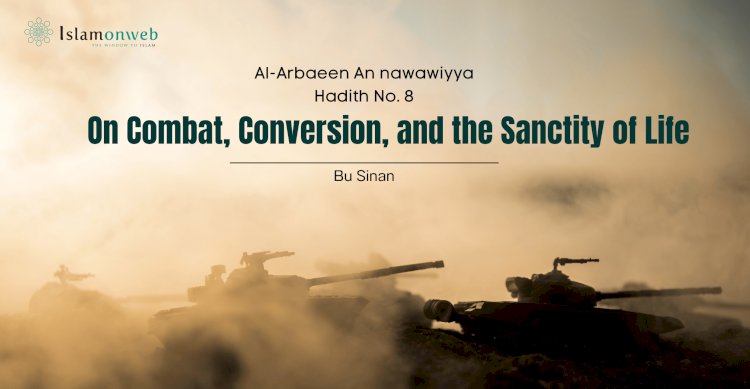



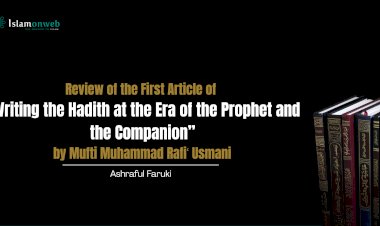
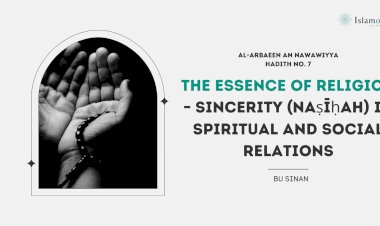
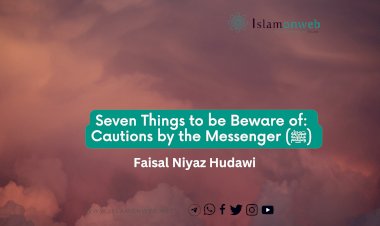

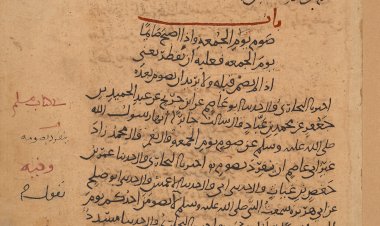














Leave A Comment